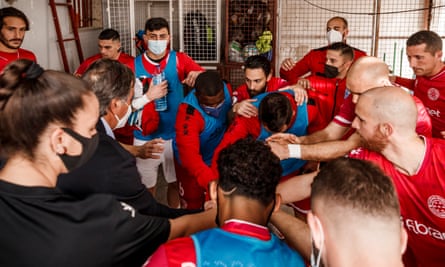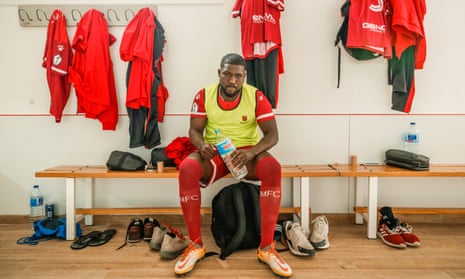Royston Drenthe’s not happy. It’s a little after 6pm and the sun is dropping behind the hill overlooking a small, unremarkable municipal football ground on the edge of a small unremarkable town in south-east Spain when he turns to the one teammate still warming up with him and asks how long’s left. “I don’t know,” Marlon Sánchez says, “five?” He’s been there half an hour stretching, watching the light fade and the game fade with it. Joaquín Parra has gone on, Carlos Álvarez has gone on but he won’t.
This story should close with the home team employing their not-so-secret weapon, the galáctico sent on to score the winner. Instead, it ends with him leaning against an advertising board for a local butcher and a nearby metalworks, looking across a plastic pitch with multiple markings where the game goes on without him. It’s 0-0, non-league, but the call still doesn’t come. When the final whistle does, Drenthe slips silently away: first off, first out. The man who played for Real Madrid doesn’t play for Racing Murcia, not today.
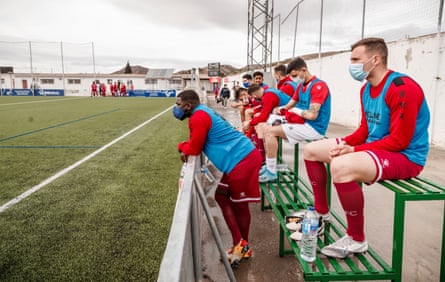
It wasn’t supposed to be this way, easy to wonder what he’s doing here, why he left his family for this. But if there’s no classic tale of redemption, it’s more real like this. It’s football. And if anyone knows that, wants it, it is him: “These things are not new for me.” One player departs furious, confronting the assistant coach; Drenthe doesn’t, embracing colleagues and quickly, quietly heading home to shower. An hour later he returns to talk, laughs at the 850km trip made to see him (not) play, and says: “It’s never nice to warm up and not come on but you take it.”
Once he might not have done. And if there is a difference between not getting on at the Santiago Bernabéu or Goodison and not getting on at the Limonar, Santomera, there is a difference between that Royston Drenthe and this one. Sergio Ramos, Marcelo and Karim Benzema, teammates then, are still at Madrid. He has been all over. At 20, Golden Player at the Under-21 Euros, he arrived at the world’s biggest club for €14m (£12.2m), unveiled as “the Dutch jewel”; at 33, he has just arrived for free at the club who are second in the Tercera División’s group 13, subgroup B.
Racing are his 11th club in six countries, following Feyenoord, Madrid, Hércules, Everton, Alania Vladikavkaz, Reading, Sheffield Wednesday, Kayseri Erciyesspor, Baniyas, Sparta Rotterdam, and Kozakken Boys. The Tercera División is not the third tier: below the 102-team Segunda División B, it has 18 divisions and 360 clubs and is anything from the eighth to the 26th. Which prompts a simple question: why? What happened?
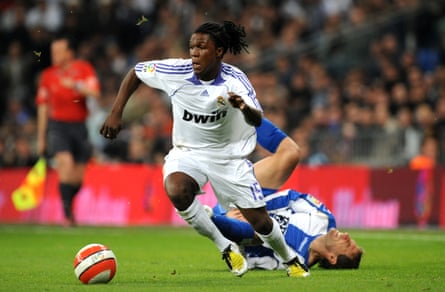
“I’m here because I still like football, you understand?” Drenthe says. “Football makes me happy, it frees my mind.” And as for what happened?, what didn’t happen? The stories are endless. Football, fiestas – “When we partied, we did it properly” – and fast cars. He reckons there could be 200 fines. The time he crashed into a police car. The rap career. Acting too, a role in the crime drama Mocro Maffia. Disillusion and distrust. Retirement and return. Reports of bankruptcy, denied. Even a strike which, looking back, might have been the start of the long search for something, for a place.
All that but no regrets, or so he says. No recriminations. While the list of clubs suggests a man not always in control of his destiny, Drenthe insists every decision was his own and there’s no bitterness. Instead, there is reflection, a recognition of mistakes made and changes in him, lessons learned. He was always good company: genuine, big-hearted. Now he seems more thoughtful, almost philosophical. Listening, you could call it wisdom.
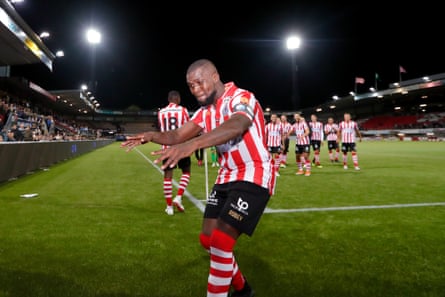
You hear it when he talks about his 10-year-old son, on trial at Sparta Rotterdam, the club Drenthe took to promotion in 2019: “He’s so happy, so focused. He’s different to me at his age: he understands things I didn’t.” Teammates hear it too, some of them just kids when he signed for Madrid. “They listen, ask questions,” Drenthe says. “I’ve been there: I was young.”
“If they ask, I explain. ‘I did this, but this is not the right way’. A lot of players just do what they’re told; I was always 100% true: I don’t want to do this, I don’t do it. Simple. That can count against you. But, listen, I did a lot of things good, too. Football is a crazy game that goes so fast and you have to make decisions quick. But if you do that, most the time it’s a bad decision. I’m learning that by myself but if someone younger asks, I explain.”
“For example, I had 24 hours to decide to stay at Madrid or go to Hércules on loan. [José Mourinho] said: ‘Playing like this, for sure I am going to put you in the team.’ But afterwards, it was the opposite.”
At Hércules, things unravelled. When players went unpaid, Drenthe was the only one speaking out on all of their behalf, eventually going on strike. Back at Madrid, they took note. In Alicante, supporters turned against him. “A normal human being working in an office comes in every day on time. He is not getting paid, but his boss wants him to improve, perform like before. That’s the craziest thing and it happens a lot in football. We like the game so much that you come into training, touch the ball and you’re happy again. But when you stop, you think: ‘How am I going to eat? I didn’t have that problem, but there were players that couldn’t go to the supermarket, fill their fridge. At dinner time some were at my house. I expected at least some supporters to say: what he did was not right but we understand why. There was graffiti on my wall. It was nasty, it was nasty.
“But it didn’t scare me. If you know where I come from, pfff.” When Drenthe was three his father was killed, he found out later. Rotterdam is “hard” but “united”, a city of “love”. He talks about gangs – the Demolition Crew, the Baby Damagers – of which he was a member. “Well, you don’t sign up, but you can call yourself a member from the moment the big guys give you a hug. So, at Hércules, I was like: ‘Ok, if you put me in this position, you’re going to know me’. You’re angry but you don’t want to know me if I’m angry [too].”“Maybe I could have done things differently, but I came back and we beat Real Sociedad and who scored the two goals? That was me, you understand?”
It was the beginning of the end, of a journey to everywhere and nowhere. England, Russia, Turkey, the Emirates. Nowhere did he play 30 league games. Drenthe kept moving on, or being moved on. In July 2016, released by Baniyas, he retired – “I wasn’t happy any more” – to be a rapper. He returned – “people kept calling, I was like ‘Ok, let’s do it again,’ and then the ‘animal’ inside comes back – and won promotion with Sparta.
“Sometimes a door just opens and sometimes a door just closes, you understand?” he says, smiling. “If you want to keep moving you take decisions.”
But did you really want to? Would you have preferred to stop, stay somewhere, settle? There’s a nod. “At Everton, I should have made a better decision. To stay, I had to go down in wage. I told [my agent]: ‘No way I’m doing that.’ Looking back, I should have. Things might have been much better. But I don’t think bad about my decisions. I took them like a man.”
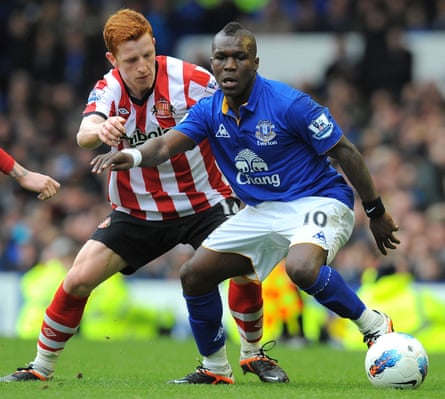
Drenthe says the problem was not David Moyes, despite telling him to fuck off one day. “Even though we fought, he was a great manager who saw a lot of potential in me. I improved a lot even if we had different mentalities. Madrid was the time I most enjoyed but at Everton I was at my best. England is great, how they live football.”
Not that there was regret leaving. Not then, anyway. “No, because at that moment I was angry. ‘I don’t care about all this [football].’ As a professional, 24, 25, you can’t think like that but that’s how I thought. I was young, reckless.”
Reckless, how? “Reckless in my mind. An example: if somebody did me wrong, I would think: I’m not talking to them again in my life. ‘Mate, you’re nothing’.
“Now I think differently. This is a new start, I feel like a grown man. I learned a lot in this life already. I am 33, some things I had to learn at 20. I am open now, you understand? I can speak to people. Then I was like ‘nah, no way I’m going to tell you how I am feeling.’ Now I am different. I was [always] honest, easy, but when I was young I could react really quick, be angry if I didn’t feel treated well. Sometimes you have to take your time, count to 10.”
There is a pause. “And sometimes just leave it.”
And so there he is: 60 minutes on the bench, 30 on the touchline, none on the pitch and Drenthe waits at the north end of the Limonar, 15km outside Murcia, where lemons grow and the sun sets behind Cabeza Bermejo. Thirty-nine people sit on whitewashed steps watching Racing against Mar Menor but not him. At the end, he passes through a corrugated metal door and into the low dressing room where pre-game the former Madrid player was just another hand reaching in to the huddle chanting: “win, win, win.” They don’t win and he doesn’t play, being a galáctico no guarantee. Drenthe is pissed off but keeps his peace, coaching staff talking about his openness, his humility, his normality; not just today, every day. “You have to stay calm. ‘OK, this happened,’ put yourself in somebody else’s shoes, take it. Next day, it’s a new day. Like I am telling the young players: patience.”
There is time, he says, work to be done – he could still lose three or four kilos – and this is just the beginning. “Physically, emotionally, sport helps. Scoring goals, helping the team makes you feel good and I needed it. I’m here to work. The plan? Get minutes: 10, 15, 20. I’m thinking that in the last five or six games I’ll be in the place I have to be. And then the play-offs come and I am going to be the Royston people know.”There is a smile. “It could be crazy, you know.”
